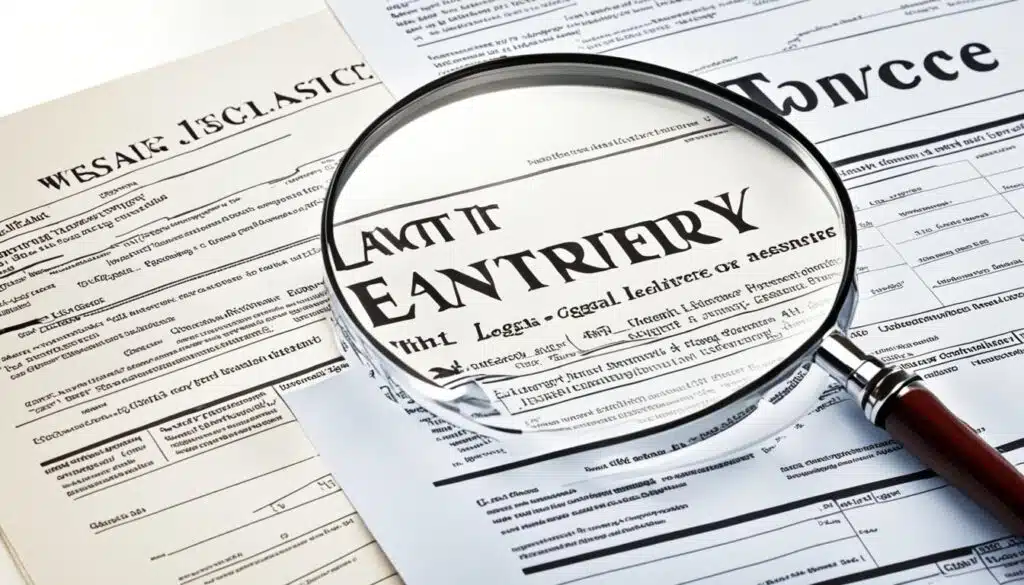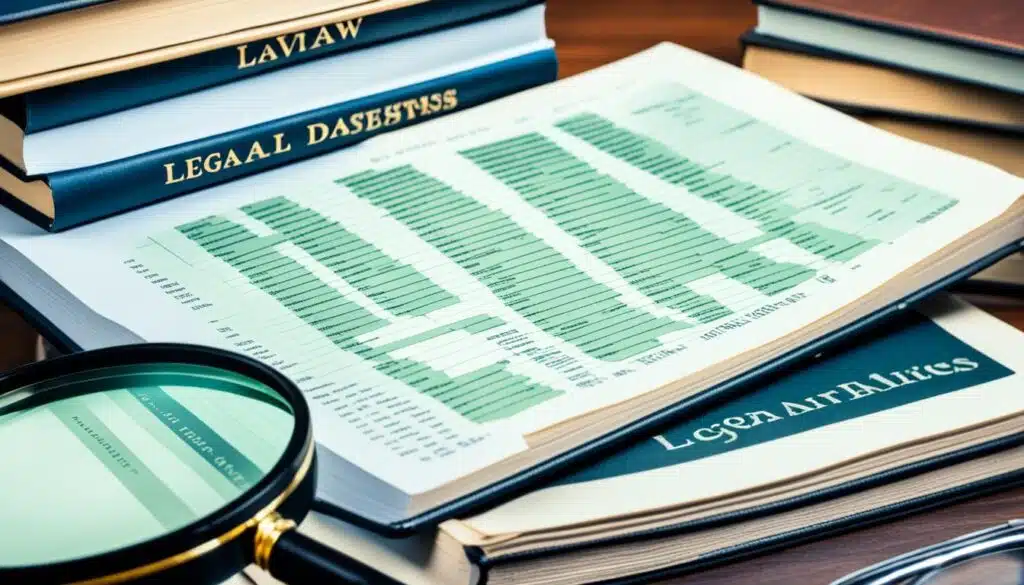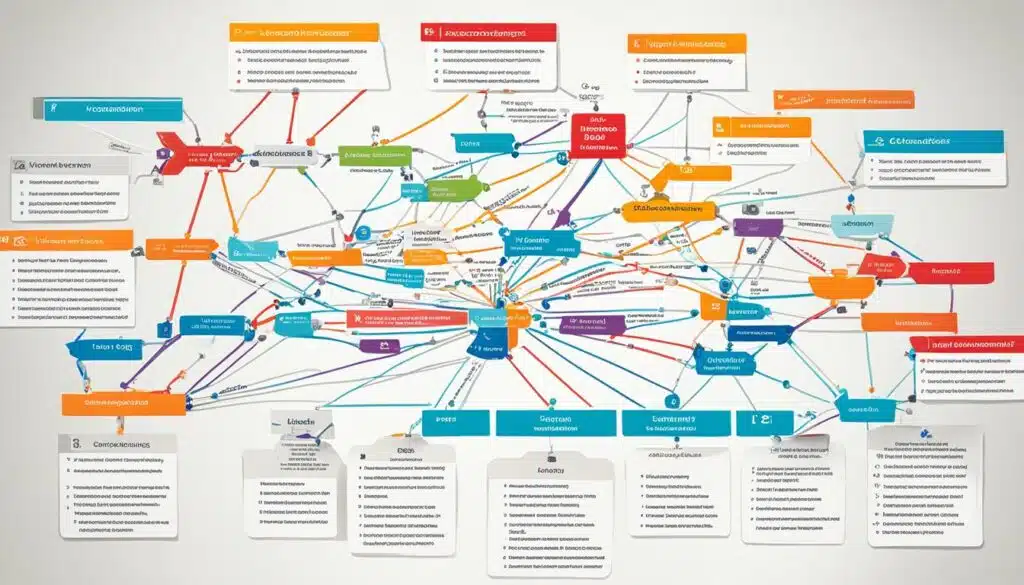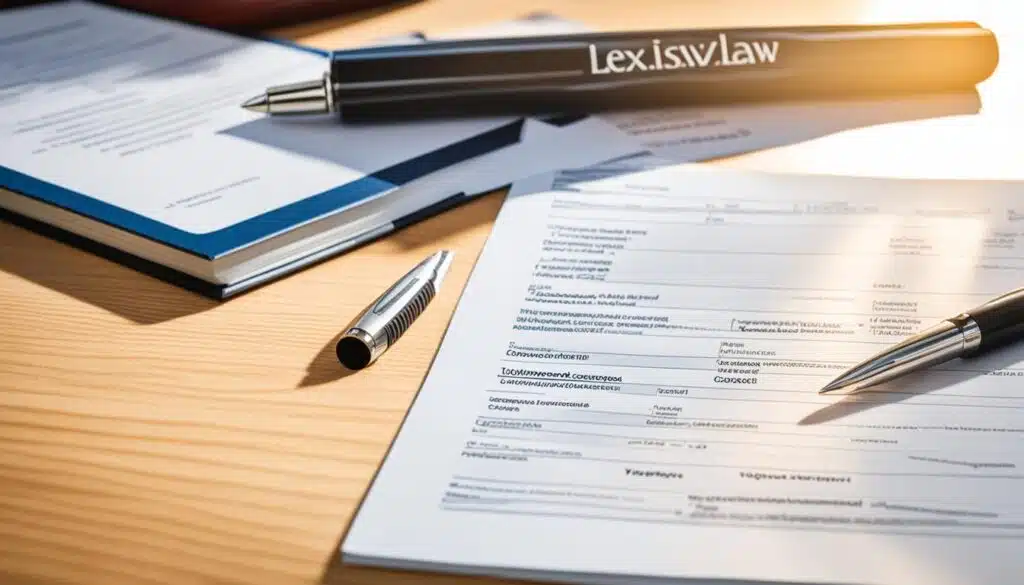Legal research is key in the law world. It lets lawyers identify, find, and cite-check info and laws needed for cases. They look at primary and secondary legal sources. These include statutes, constitutions, and more. Good legal research helps makes cases stronger and gets better results for clients.
This guide looks at the basics of legal research. It includes identifying relevant sources, verifying the validity of legal sources, and improving legal research skills. These are important at any point in a lawyer’s career.
Key Takeaways
- Legal research is essential for identifying, finding, and verifying information and applicable laws needed to support legal decision-making.
- Effective legal research empowers arguments, gives substance to legal work, and leads to better outcomes for clients.
- This guide will cover the fundamentals of the legal research process, including identifying relevant sources, verifying the validity of legal sources, and improving legal research skills.
- Legal research involves utilizing both primary and secondary legal sources, such as statutes, constitutions, regulations, and court orders.
- Mastering legal research techniques is crucial for attorneys at any stage of their career.
Understanding Legal Research and Its Importance
Legal research is key for lawyers to gather and check legal info and laws. This lets them make solid legal decisions. It uses laws, constitutions, and court decisions. Doing legal research helps strengthen arguments. It also adds depth to legal work. This leads to better results for people needing legal help.
What is Legal Research?
Legal research means finding and confirming legal facts and laws for a case. This process digs into case law, statutes, and other legal sources. It’s about gathering the right information to help with a legal argument or decision.
Also Read : How Are Administrative Law Decisions Made?
Why is Legal Research Crucial?
Legal research is crucial for attorneys. It helps them find laws that fit a case’s facts. This support decesion-making process strong. Without it, arguments might not stand well, leading to bad outcomes for clients. By researching well, lawyers can make a case that’s solid and likely to win.
Defining the Legal Issue and Gathering Facts
First, it’s key to define the legal issue and gather facts. This step involves three parts: Identifying the Legal Issue , Collecting Relevant Facts , and Determining the Relevant Jurisdiction Identifying the legal issue means clearly outlining the problem or question. This might mean dissecting a statute, a legal doctrine, or a contract term. Pinpointing the issue helps build a focused research plan.
Gathering facts is the next important step. Details like who, what, when, where, and how give context. It’s crucial for understanding the situation fully. These details include names, dates, places, and actions taken.
Lastly, determining the relevant jurisdiction is very important. This means finding the laws that apply to the legal issue. Laws might be different based on the area or topic. Knowing the right jurisdiction helps target the research to the correct legal grounds.
Also Read : What Is The Purpose Of International Law?
| Legal Research Step | Key Considerations |
|---|---|
| Identifying the Legal Issue |
|
| Collecting Relevant Facts |
|
| Determining the Relevant Jurisdiction |
|
By carefully defining the legal issue, gathering the relevant facts, and determining the applicable jurisdiction, the researcher lays the groundwork for a focused, streamlined legal research process. This foundational step ensures the researcher has a well-defined framework, understands what is known and what remains to be found, and can narrow the field of potential search terms to identify the most relevant legal sources.
Also Read : How Can An Environmental Lawyer Protect Natural Resources?
Finding Relevant Sources of Law
Understanding the types of legal sources is vital for good legal research. There are two main kinds: primary sources and secondary sources.
Primary Sources: Case Law, Statutes, and Regulations
Primary legal sources set the law’s current state. They include federal and state constitutions, statutes, regulations, treaties, and case law. Lawyers look deep into these to understand the laws and precedents that matter to their case.
Secondary Sources: Legal Journals, Treatises, and Practice Guides
Researchers also use secondary sources. These give detailed explanations of legal principles. They include law review articles, legal treatises, and practice guides. Although not the law itself, they offer background info and point to important primary sources.
Combining primary and secondary sources helps lawyers deeply understand the law. While primary sources are crucial, starting with secondary sources can provide key context and lead to the right primary authorities.
Also Read : What Are Key Principles Of Corporate Law?
Effective Use of Legal Databases and Online Resources
In today’s world, legal research isn’t limited to just library visits. Now, thanks to the internet, lawyers can do their work from anywhere.
Platforms like Fastcase and Casetext, along with tools such as CourtTrax, make huge legal databases available. They are handy for looking up laws anytime. Plus, they work well with management tools like Clio Manage. This means findings can be directly used in a lawyer’s work.
Also Read : What Are The Different Interpretations Of Law?
Utilizing Online Legal Research Platforms
Next, online platforms for legal research are full of case law, statutes, and more. They can be accessed from any connected device. This means lawyers can find necessary legal info quickly. Also, some tools even use AI for smarter searching.
Integrating Legal Research with Practice Management Software
When legal research mixes with management software, it’s a win for everyone. It helps lawyers work better with their clients’ cases. They can connect what they find directly to their legal practice. This boosts their work speed and quality, offering clients a better legal service.
Legal Research Techniques
Starting your legal research with secondary sources is a smart move. Legal journals, treatises, and guides are goldmines. They offer background info, point you to primary sources, and save you time by using experts’ work.
Starting with Secondary Sources
Reading secondary sources first lays a strong foundation. Legal commentaries help you get the big legal picture. You’ll understand legal basics, top cases, and current issues in your area. This makes finding primary legal materials, like laws and case law, easier.
Finding and Analyzing Case Law
When secondary sources are familiar, focus shifts to case law. Use tools like headnotes and Key Numbers to spot relevant cases. Then, dig deep into each case. Look at the facts, the legal reasoning, and the ruling. It helps you understand the law in detail.
Statutory and Regulatory Research
Researching laws and regulations is vital too. Start with annotated codes. They help connect laws to relevant cases and secondary materials. This method ensures you cover all legal bases. It’s key for making strong legal points and advice.
Mixing primary and secondary sources gives you a full grasp of the law. It makes your arguments solid
Verifying the Validity of Legal Sources
After you find important legal sources, checking if they’re “good law” is key. This means making sure they’re still valid and haven’t been updated or questioned. It’s an important step in legal research to maintain the quality of work.
Using Citators to Check for “Good Law”
Legal citators like KeyCite and Shepard’s are crucial for this. They give a complete look at the history of a law or case. This helps researchers spot any issues, like important cases being overturned or laws changing, that could weaken their position.
Evaluating Precedential Value
It’s also vital to weigh the precedential value of legal sources. Newer, more definitive court decisions often carry more weight. Yet, any case could still be important, even if not directly overruled. Researchers strengthen their arguments by considering this closely, ensuring they use the best legal support.
Thoroughly vetting legal sources and their importance improves the quality control of legal research. It keeps legal work in line with the best legal research best practices.
Advanced Legal Research Strategies
Legal experts are always looking for ways to improve their work. They are now using new strategies and tools. These include legal research AI and empirical legal research.
Utilizing Legal Research AI
Legal research AI tools, like ROSS Intelligence and Casetext, automate tasks. They quickly find important case law and check if sources are reliable. They can even suggest more sources. This helps lawyers do deeper research in less time. They can then focus more on the important parts of their work.
Conducting Empirical Legal Research
Attorneys are also using data analysis to improve. They look at big sets of legal data. This data can be from court cases, new laws, and industry trends. Over time, they find patterns and key information. By using this approach, lawyers make better decisions. They can also give more helpful advice to their clients.
By combining AI and data research, legal experts are getting better. They provide more effective and efficient services. This benefits their clients.
Ethical Considerations in Legal Research
Legal research needs honesty and sticking to ethical laws. Legal pros have to be right in what they find and say. They must not leave out key info that could hurt their points. Not following these rules can lead to bad outcomes like punishments or lawsuits.
Maintaining Integrity and Accuracy
Lawyers doing research need to check that their sources are true. They should make sure they understand the law correctly. They also need to avoid copying work or twisting truths. Always think about different points of view and don’t just pick data that fits what you already think.
Confidentiality and Privilege
Keeping client’s secrets and rights is very important. Attorneys must keep private info safe. This could mean using secure digital files or limiting who can see secret data. It’s also crucial to only share research in a way that keeps the client’s privacy.
By following these rules, researchers keep the legal world’s standards high. They serve their clients the best they can. Being ethical is not just a job rule but a big part of giving good and reliable legal help.
Continuous Learning and Skill Development
Effective legal research takes time and effort. It’s a never-ending journey of learning and growth. Lawyers must always keep up with new laws and court decisions to do their job well.
Staying Updated with Legal Developments
The law is always changing. Legal experts must stay alert to updates. They do this by keeping an eye on new laws, rules, and important court decisions that might affect their work.
To stay current, lawyers read legal news, attend seminars, and use the latest research tools. This way, they stay on top of what’s happening in the legal world.
Collaborating and Sharing Knowledge
Joining forces with coworkers can make legal research stronger. By talking with others in the field, lawyers find new insights. They learn new approaches and discover new sources for their research.
Creating programs or joining groups where research is shared helps a lot. This can lead to ongoing improvement and keep legal professionals ahead in their work.
Always aiming for better is key. This approach helps lawyers grow their research skills all the time, making their legal work better.
Also Read : The Importance Of Contract Law In Business
Conclusion
In the end, good legal research is key in the law field. It makes attorneys ready with strong arguments and solid advice for their clients. This guide has shown how to do legal research well, from stating the issue to checking the law sources and using advanced strategies and technologies.
To get better at research, legal pros should follow a clear path, be honest, and keep learning. Being great at legal research means they can handle law’s twists and turns. It helps them offer top-notch legal help.
Doing legal research right is crucial, as it sets the stage for smart legal debates, exact advice, and winning for clients. The steps and best practices in this guide help lawyers stand out. They can do their job better and win more often.
FAQs
What is legal research?
Legal research is all about finding and verifying information. This info supports making legal decisions. It uses laws from various sources like statutes and court orders.
Why is legal research crucial?
Good legal research boosts arguments and helps make sound legal decisions. It’s crucial for lawyers to locate the right laws for their cases. This leads to better outcomes for their clients.
How do I define the legal issue and gather facts for legal research?
To start, define the legal problem and gather facts. Identify the main issue and collect all the important details. Also, figure out where the case will be resolved.
What are the different types of legal sources used in research?
There are primary and secondary sources. Primary sources like laws establish what’s legal now. Secondary sources, including articles, help explain these laws.
How do I effectively use legal databases and online resources for research?
Today, online platforms make research easier. They allow for remote research. Websites like Fastcase offer access to lots of legal info.
What are the key legal research techniques I should use?
Begin with secondary sources, such as articles and guides. They give background info and point to primary laws. Then, check case laws and regulations for more details.
How do I verify the validity of the legal sources I find?
Once you find sources, it’s vital to check their status. You want to ensure they are still valid. Westlaw’s KeyCite helps keep things updated.
What are some advanced legal research strategies I can use?
Use AI to speed up your research by pinpointing relevant laws. Also, analyzing big legal datasets can offer new insights. This can help make strategic decisions.
What ethical considerations are important in legal research?
Accuracy and honesty in findings are key ethical points. It’s crucial not to misuse or hide data. Also, respect client privacy and any privileged information.
How can I continuously improve my legal research skills?
Legal research skills need ongoing improvement. Stay updated and share info with others. This will keep your skills sharp throughout your career.













